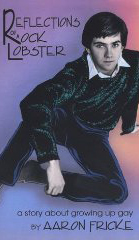Two "Queens" Attend Prom - Together, 1980
By Erica Davies
Aaron Fricke was born in January 25, 1962 in Providence, Rhode Island and is renowned for his pivotal federal court case win in equal rights and human rights. Shortly after he publicly declared he was gay in 1980, he started dating Paul Guilbert and decided to ask him to his Cumberland High School senior prom in Cumberland, Rhode Island. [1] The high school principal, Richard Lynch, informed Aaron this was unacceptable and objectionable to school codes because it "upset other students, sent the community abuzz, and rallied out-of-state newspapers to consider the matter newsworthy." Aaron filed a lawsuit and contended that the school's action was a direct violation of his first amendment right of association, his first amendment right to free speech, and his fourteenth amendment right to equal protection of the laws. [2] Due to its controversial nature, the event reached a heightened status of publicity in the school and in the press. After the lawsuit was officially filed, a student violently shoved and punched Fricke in the hallways during an unprovoked attack, which earned the assailant nine days of suspension and Fricke five stitches under his eye. [3]
The 18 year-old Fricke told Chief United States District Court Judge Raymond J. Pettine it was imperative that the school ban be overturned because it violated his free expression and the right to be accompanied by a male date to the senior dance. "I feel I have the right to attend. I feel I want to go to the prom for the same reason any other student would want to go," Fricke said at the first hearing.[4] The verdict was later ruled not only in favor of Fricke, but with enforceable instructions that the school provide additional security as a safety precaution for the couple. Judge Pettine stated, "He feels his attendance would have a certain political element and would be a statement for equal rights and human rights."[5]

Fricke's case was deemed a remarkable and major milestone in the history of gay rights and set legal precedent in the court room. "I thought of all the people who would have enjoyed going to their proms with the date of their choice, but were denied that right...but gradually we were triumphing over ignorance. One day we would be free."[7] Fricke later documented his civil and legal experiences in a book entitled Reflections of a Rock Lobster: A Story about Growing Up Gay. It is highly referenced for those ambivalent about publicly acknowledging their sexual identity and prompted a sequel, which Fricke collaborated with his father Walter, called Sudden Strangers: The Story of a Gay Son and His Father. It embraces a parent's road to acceptance of a child's sexual orientation and the love and hardships shared together.[8]
References
- ↑ Best, Amy L. Prom Night: Youth, Schools, and Popular Culture. Pgs. 154-55.
- ↑ United States District Court for the District House of Rhode Island. "Aaron Fricke vs. Richard B. Lynch, as Principal of Cumberland High School," May 28, 1980. Accessed November 22, 2007. www.aclu.org/FilesPDFs/fricke.pdf
- ↑ Cain, Patricia A. Rainbow Rights: The Role of Lawyers and Courts in the Lesbian and Gay Civil Rights Movement. Pgs. 99-100.
- ↑ Savin-Williams, Ritch C. And Then I Became Gay: Young Men's Stories. Pgs. 162-63.
- ↑ Krebs, Albin and Cummings, Judith. "Aaron Fricke," New York Times. May 29, 1980.
- ↑ http://ecx.images-amazon.com/images/I/41REPFDNEYL._SL500_AA240_.jpg
- ↑ Fricke, Aaron. Sudden Strangers: The Story of a Gay Son and His Father.
- ↑ ibid.